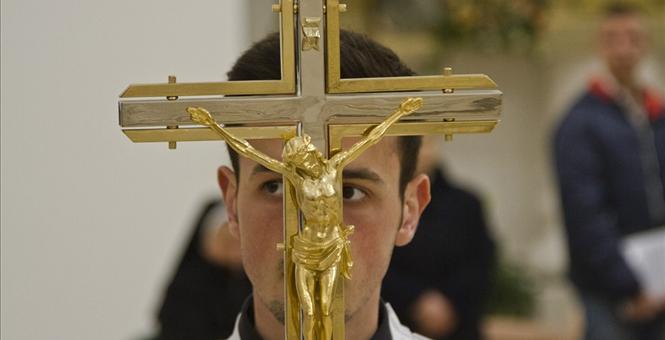Caitlin Trussell with Augustana Lutheran Church for Christ the King Sunday on November 22, 2020
[sermon begins after two Bible readings]
Matthew 25:31-46 [Jesus said to his disciples] “When the Son of Man comes in his glory, and all the angels with him, then he will sit on the throne of his glory. 32 All the nations will be gathered before him, and he will separate people one from another as a shepherd separates the sheep from the goats, 33 and he will put the sheep at his right hand and the goats at the left. 34 Then the king will say to those at his right hand, ‘Come, you that are blessed by my Father, inherit the kingdom prepared for you from the foundation of the world; 35 for I was hungry and you gave me food, I was thirsty and you gave me something to drink, I was a stranger and you welcomed me, 36 I was naked and you gave me clothing, I was sick and you took care of me, I was in prison and you visited me.’ 37 Then the righteous will answer him, ‘Lord, when was it that we saw you hungry and gave you food, or thirsty and gave you something to drink? 38 And when was it that we saw you a stranger and welcomed you, or naked and gave you clothing? 39 And when was it that we saw you sick or in prison and visited you?’ 40 And the king will answer them, ‘Truly I tell you, just as you did it to one of the least of these who are members of my family,[a] you did it to me.’ 41 Then he will say to those at his left hand, ‘You that are accursed, depart from me into the eternal fire prepared for the devil and his angels; 42 for I was hungry and you gave me no food, I was thirsty and you gave me nothing to drink, 43 I was a stranger and you did not welcome me, naked and you did not give me clothing, sick and in prison and you did not visit me.’ 44 Then they also will answer, ‘Lord, when was it that we saw you hungry or thirsty or a stranger or naked or sick or in prison, and did not take care of you?’ 45 Then he will answer them, ‘Truly I tell you, just as you did not do it to one of the least of these, you did not do it to me.’ 46 And these will go away into eternal punishment, but the righteous into eternal life.”
Ephesians 1:15-23 I have heard of your faith in the Lord Jesus and your love toward all the saints, and for this reason 16 I do not cease to give thanks for you as I remember you in my prayers. 17 I pray that the God of our Lord Jesus Christ, the Father of glory, may give you a spirit of wisdom and revelation as you come to know him, 18 so that, with the eyes of your heart enlightened, you may know what is the hope to which he has called you, what are the riches of his glorious inheritance among the saints, 19 and what is the immeasurable greatness of his power for us who believe, according to the working of his great power. 20 God put this power to work in Christ when he raised him from the dead and seated him at his right hand in the heavenly places, 21 far above all rule and authority and power and dominion, and above every name that is named, not only in this age but also in the age to come. 22 And he has put all things under his feet and has made him the head over all things for the church, 23 which is his body, the fullness of him who fills all in all.
[sermon begins]
Christ the King Sunday is a relatively new holy day in the church. Almost 100 years ago, there was a Catholic Pope, Pius XI, concerned about the rise of fascism in Spain, communism in Russia, antisemitism presaging nazism in Germany, and secularism in the West.[1] That’s a lot of -isms! So seductive were these -isms, they captured the imagination of faithful Christians who decided God was on their side. Pope Pius XI spotlighted the Lordship of Jesus to refocus the faithful in 1925. Lutherans adopted the Christ the King celebration in the 1970s. That’s pretty much yesterday in the grand sweep of 2,000 years of church history. Christ the King Sunday now ends our church year. It’s like a wacky New Year’s Eve of sorts for church types. And, frankly, there’s more than a few of us who wouldn’t mind seeing the new year start sooner than later.
The Biblical texts for Christ the King Sunday hone in on judgment and Jesus in the distant heavens – a shiny Jesus of exaltation and ultimate hope, a Jesus post-crucifixion and post-resurrection, a Jesus large and in charge against forces that defy God’s message of “the life that was light for all people.”[2] Like the praise song sings about Jesus, “…to see you high and lifted up, shining in the light of your glory…”[3] Who DOESN’T want Jesus to be THAT Jesus?![4] It’s seductive in its own right. It’s also Biblical. It’s in our Ephesians reading. Listen again to that reading as Paul writes:
“I pray that the God of our Lord Jesus Christ, the Father of glory, may give you a spirit of wisdom and revelation as you come to know him, 18 so that, with the eyes of your heart enlightened, you may know what is the hope to which he has called you, what are the riches of his glorious inheritance among the saints…”[5]
Those are beautiful words, a beautiful promise. Read the whole Ephesians reading again. It’s full of light, hope, victory, and heavenly Jesus at the right hand of God. A few weeks ago I passed a church sign that said, “GOD’S GOT THIS!!!” All caps and lots of exclamation points added for . My first thought was that, if God’s got this, then it doesn’t seem like God knows what God’s doing. Truly, that was my first thought. Oh, I have enough grace to know what that church meant with the “GOD’S GOT THIS!!!” sign. But I also wondered what people of other faiths or no faith were thinking when they passed that sign. People who have been beaten up with readings like today’s Gospel reading from Matthew. People who have had enough with being called “goats” by Christians.
Make no mistake, this is a text about law and judgment.[6] Jesus has harsh words for his followers. He’s desperately trying to get them to understand his message before his trial and crucifixion coming up next in the story. I find it fascinating that both the sheep and the goats in his story ask the same question, starting with the same word, “When…?”[7] When were you hungry, thirsty, strange, naked, sick, and in prison? When did or didn’t we give you food, water, welcome, clothes, and a visit? Both the sheep and the goats ask the question about when they would have seen Jesus in these scenarios. Neither group understood what Jesus meant. How could they understand? It’s a weird concept and an incomprehensible truth. Jesus looks out through the eyes of the least victorious people on earth. Jesus is fully present, fully incarnate, fully embodied in people who are hungry, thirsty, strange, naked, sick, and in prison. What does that even mean?!
Almost a year ago, last Christmas Eve, I preached a sermon called “Praise the Sweet Baby Jesus.”[8] We’ll be getting there soon as Advent begins next Sunday and as we await the celebration of Jesus’ birth and Christ coming again. The gist of that sermon was about the many names of Jesus and the Jesus we call upon in our moments of need – the baby, the bearded Jesus, Counselor Jesus, Mighty God Jesus, Prince of Peace Jesus…you get the picture.[9] Flipping that sermon around, we find ourselves called upon by Jesus in these verses from Matthew – Hungry Jesus, Thirsty Jesus, Strange Jesus, Naked Jesus, Sick Jesus, Imprisoned Jesus. Not only is Jesus in the heavenly places, Jesus is in other people’s faces. Jesus ascended into heaven. And Jesus never left. Let THAT sink in. Jesus ascended into heaven beyond our understanding. Jesus is here with us, never having left us, in the suffering that we encounter in other people and in ourselves.
Neither the sheep nor the goats understand a thing about when Jesus is with them. Judgment falls where judgment will…on all of them. Parables like these have been wrongly used to terrify people throughout the centuries. But we are told about Jesus, by Jesus. We’re welcomed into Jesus’ way of seeing each other. Seeing each other not as means to end to lock-in salvation but rather seeing people as an end unto themselves, as the promised presence of Jesus right in front of us. The promised presence of Jesus not to be ignored but to be fed, hydrated, clothed, welcomed, and visited. Jesus cannot say this to us any more clearly then he is right here.
However, there’s a key piece of information standing between the judgement of this parable and the heavenly places. The cross is standing there. Jesus turns from this speech, from this run of harsh parables on the Mount of Olives,[10] towards another hill that’s looming large, and a time when he will soon hang on a cross – hungry, thirsty, strange, naked, sick, and imprisoned. Right there, on that cross, that’s the good news about how “God’s Got This.”
Jesus who judges, is the Jesus who loves the most. Jesus the Christ who was vulnerable, non-violent, and self-sacrificing on the cross, resurrected into Christ the King who judges not in retribution, not to get even, but judges as the Light, the Life of all people.[11] Every failure that we accrue as goats will be stripped away.[12] We will be people who fully see Jesus through the enlightened eyes of our hearts.[13] We’ll see Jesus in other people not by our own power but by the power of Christ the King, the prodigal judge, who sees all of who we are in our goatness and loves us beyond our limitations through God’s reckless and extravagant grace.[14] Happy Church New Year everyone. This is good news indeed!
_______________________________________________________
[1] Frank C. Senn. The Not-So-Ancient Origins of Christ the King Sunday. Lutheran Forum. November 11, 2017. https://www.lutheranforum.com/blog/2017/11/11/the-not-so-ancient-origins-of-christ-the-king-sunday
[2] John 1:4
[3] Listen to that Michael W. Smith song sung by him here: https://video.search.yahoo.com/search/video?fr=mcafee&p=open+the+eyes+of+my+heart+lord+video#action=view&id=25&vid=211c211f61d6e3caea769d90f9354740
[4] Pastor Barbara Berry Bailey, St. Paul’s Lutheran Church, Denver, CO. Discussion on November 3, 2020, in Preacher’s Text Study of Metro East Conference, Rocky Mountain Synod, ELCA.
[5] Ephesians 1:17-18
[6] John Petty. Commentary on Matthew 25:31-46. November 20, 2017. https://www.progressiveinvolvement.com/progressive_involvement/2017/11/christ-the-king-matthew-25-31-46.html
[7] Pastor Margot Wright, Lord of the Hills Lutheran Church, Centennial, CO. Discussion on November 17, 2020, in Preacher’s Text Study of Metro East Conference, Rocky Mountain Synod, ELCA.
[8] Find that sermon here: http://caitlintrussell.org/2019/12/24/praise-the-sweet-baby-jesus-luke-21-20-and-isaiah-92-7/
[9] Isaiah 9:6
[10] Matthew 24:3
[11] Petty, ibid.
[12] Ibid.
[13] Ephesians 1:18
[14] Yes, I’m invoking the Parable of the Prodigal Son and the image of the Father running with wild abandon. Luke 15:11-32.

![If God’s Got This, God Doesn’t Seem to Know What God’s Doing [OR Happy Church New Year’s Eve Everyone] Matthew 25:31-46 and Ephesians 1:15-23](http://caitlintrussell.org/wp-content/uploads/2020/11/Hungry-fed-me-Thirsty-gave-me-a-drink-Matthew-25-35-36-The-Message-672x372.png)
![Loving Before Knowing [OR The Foolishness of the Cross] Matthew 5:1-12, 1 Corinthians 1:18-31](http://caitlintrussell.org/wp-content/uploads/2017/01/cross-equals-heart-sermon-Caitlin-Trussell-672x372.jpg)

![It Seemed to Them an Idle Tale [OR How Idle Tales DO Pile Up] – Luke 24:1-12](http://caitlintrussell.org/wp-content/uploads/2016/03/empty-tomb.Jesus_.women_.sermon-Caitlin-Trussell.-672x372.jpg)

